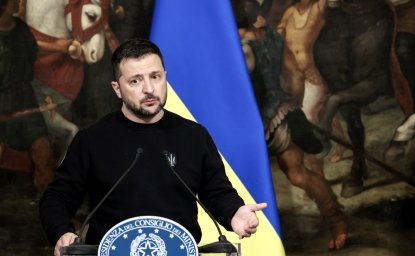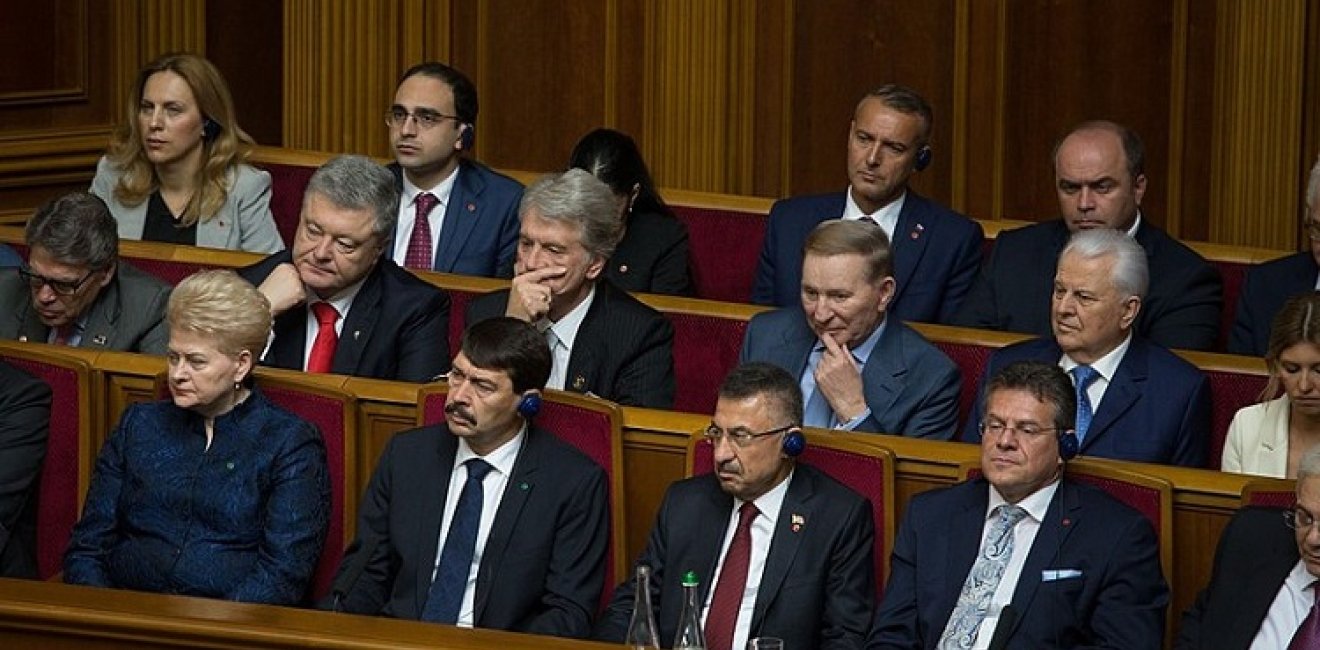
A blog of the Kennan Institute
BY NATALIA KUDRIAVTSEVA
The Law on Ensuring the Functioning of Ukrainian as the State Language was passed by the Ukrainian parliament on April 25, 2019, after two readings and the introduction of more than 2,000 amendments within the half year after it was first approved, in October 2018. After approval, the law became a cornerstone in then president Petro Poroshenko’s reelection campaign. A contentious subject, and not considered a top priority among Ukrainian voters, the law was nevertheless signed by Poroshenko five days before the end of his term. It is set to take effect July 16, 2019.
On the day the law was passed, Volodymyr Zelenskyy declared on Facebook that he would make sure “all the constitutional rights and interests of all Ukraine’s citizens” were observed — an indirect expression of dissatisfaction with the new requirements. “Protecting rights” becomes complicated, however, when two distinct conceptions of rights are involved. Ukraine’s treatment of the issue of language is an exemplary case of the conflict between two conceptions of rights: the rights of a language and the rights of its speakers. (In post-Soviet states, the “rights” of a language pertain to priority uses of the official language — in contrast to minority languages — on the territory of the country for official government business, matters in the public sphere, service provision, the media, and other stipulated contexts.)
Adopted by local policymakers and their domestic and international critics, these two conceptions counterpose the rights of the country’s official language to the rights of a human who is free to choose the language of communication. In Ukraine, where language has been put forward not just as a tool of communication but primarily as an identity marker, policymakers more often seek to protect the rights of the language in order to strengthen people’s sense of belonging, reinforce state unity, and strengthen the viability of the Ukrainian nation. This ideology, propagated in elite mobilization rhetoric, has underpinned the transition from Yanukovych’s bilingual policy to the monolingual policy of post-Euromaidan Ukraine and justified the new legislation aimed at promoting the use of Ukrainian in all public spheres.
Public opinion on the direction that state policies in the language sphere should take was captured in 2017, the year the draft of the new law was first introduced to the masses. Some 61 percent of survey respondents favored state support for the Ukrainian language. This support, which had been growing perceptibly in all Ukraine’s regions since 2012, was still outweighed by the concern over the status of Russian in the more Russian-speaking South and East. Though the majority preference (60.1 percent) for Ukraine’s future language situation is monolingual, the southern and eastern parts almost proportionally (60.7 and 60.5 percent, respectively) supported a bilingual perspective.[1]And it is precisely the rights of the citizens, those speaking Ukrainian as well as Russian, that people want the state to protect.
The new law clearly prioritizes protection of the rights of language: of the law’s seven tasks positioning language as a major avenue of constructing identity and a driving force in nation-state building, only the last one mentions the “language needs” of Ukrainian citizens and Ukrainians living abroad. The law launches a state program to promote the learning of Ukrainian through a network of free language courses available to all. Of special significance is the purity of the language, whose “vulgarization” and “intended distortion” in official documents will incur liability under the new law.
A National Committee for the State Language Standards is to be established to develop the Ukrainian language standards. The committee will also examine and certify the Ukrainian language proficiency of persons who wish to acquire Ukrainian citizenship or intend to become state employees or pursue a career in the military, diplomatic corps, law, medicine, or education. The Commissioner for the Defense of the State Language, another novelty of the 2019 legislation, is to carry out the tasks of protecting the Ukrainian language, as well as the rights of Ukrainian citizens to receive information and service in Ukrainian across public domains. The commissioner also decides on the size of the fine to be imposed (U.S. $130–455) in case of repeated breaches.
As for citizens’ language rights, the law does allow for some multilingualism. The right to be educated in a minority language can be exercised in Ukraine’s public schools, but only at preschool and elementary stages. At the university level, it is also possible to have one or several courses taught in English or other official languages of the European Union. A similar linguistic diversity is permitted in science, art, entertainment, theater, and cinema, provided that a film or a theatrical play is subtitled (or translated) into Ukrainian too. Print media may be accessible in any language, if the same number of copies of identical content appear in Ukrainian on the same day. For books, the law prescribes a minimum of 50 percent of Ukrainian-language titles be published within a year. The quota in broadcasting remains 75 percent for Ukrainian-language content. The language of the service sector, transportation, and public medicine is Ukrainian, though a different language may be used if the client or patient requests it.
Under this law, Russian is envisioned solely as a minority language, available as a medium of instruction in kindergartens and elementary schools; a means of communication at academic conferences on Russian philology; and a language used at cultural events and performances (should the author or artist suggest its use). Russian may also be used in newspapers, magazines, journals, and books, as well as in TV and radio broadcasting, provided the respective share of Ukrainian-language product is observed. In cafes and shops, public transport and hospitals, Russian can be spoken too, if agreed on by both parties. Finally, the domain of private communication is free of legislative regulation, which allows various languages to be used.
Since many of the provisions are postponed for a period ranging from six months to ten years, the 2019 law provides for a gradual, nonspeedy Ukrainianization. Its ideological loading resonates with time — Ukraine is now marking the fifth year of ongoing armed conflict with Russia — as the law embodies a symbolic victory of the Ukrainian language over Russian. Whether Ukrainian people speaking different languages also come out as winners depends on how the law is implemented. And this remains to be seen.
[1]Volodymyr Kulyk, “Zakon pro funktsionuvannia ukraїns’koї movy v svitli preferentsii hromadian shchodo movnoї polityky derzhavy” [The law on the functioning of the Ukrainian language in light of citizens’ preferences for the state language policy], forthcoming in Naukovi Zapysky, I. F. Kuras Institute of Political and Ethnic Studies.
Author

Associate Professor, Kherson National Technical University

Kennan Institute
The Kennan Institute is the premier US center for advanced research on Eurasia and the oldest and largest regional program at the Woodrow Wilson International Center for Scholars. The Kennan Institute is committed to improving American understanding of Russia, Ukraine, Central Asia, the South Caucasus, and the surrounding region though research and exchange. Read more

Explore More in Focus Ukraine
Browse Focus Ukraine
Building a Thriving Ukrainian Design Community Now

Ukraine Seeks to End the War. What's Wrong With the “Peace Scenarios”?


